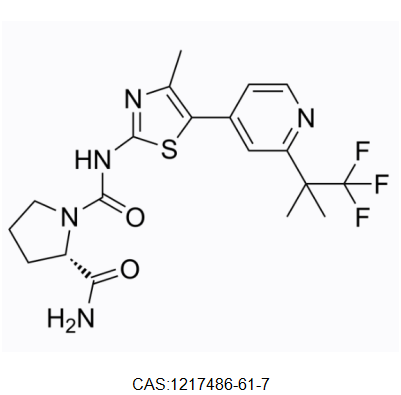InCellChem

Search
NameDescriptionContent
We Devoted Ourselves To The Development Of Biomedical Research Reagent.
Product Details
-


-
BYL-719,1217486-61-7,IC-0231143
BYL719 (Alpelisib) is a selective PI3Kɑ inhibitor.It induced fewer toxicities and had a more favorable safety profile compared to a pan class I PI3K inhibitor.PI3K/AKT and mTOR pathways regulate several processes involved in cell survival, protein synthesis, cell proliferation and differentiation, metabolism, senescence, motility, and angiogenesis.Results from preclinical studies show that BYL719 inhibits PI3K signaling and prevents AKT phosphorylation in cell lines harboring?PIK3CA?mutations, and blocks tumor growth in xenograft models[1].
BYL-719 treatment induced G0/G1 cell cycle arrest irrespective of PIK3CA mutational status. Notably, in PIK3CA-mutant cells (AGS and MKN1), sub-G1 fraction remarkably increased (p?In mouse xenograft model of PIK3CA-mutant MKN1 GC cells, BYL-719 (25mg/kg/day) combined with paclitaxel (20mg/kg/day) significantly enhanced anti-tumor activity by decreasing Ki-67 expression and increasing TUNEL expression. Moreover, this combination prolonged the survival of tumor-bearing mice during 4 weeks of treatment period without resulting in significant change in body weight[2].
Oral consumption of BYL-719 results in dose-dependent hyperglycemia and hyperinsulinemia. Littermates were block-randomised to receive either the diet containing either 0.3 g/kg BYL-719. Following 6 weeks of treatment higher fed blood glucose and plasma insulin levels were evident in the BYL-719 treated groups, and a trend towards decreased body weight was seen with BYL-719 treatment without a difference in food intake. We have previously shown that p110α inhibitors can prevent weight gain in young (4–5 weeks old) mice during development[3].
BYL-719 reduces obesity and elevates energy expenditure in mice.The most dramatic on-target effect of BYL-719 was hyperglycemia, which in the case of the ob/ob mice was severe due to their diabetic condition.However, it is important to note that in normal lean mice, the glycemia induced by PI3Kɑ inhibition is within physiological range [4].-
0.000.00
-
Discription
BYL719 (Alpelisib) is a selective PI3Kɑ inhibitor.It induced fewer toxicities and had a more favorable safety profile compared to a pan class I PI3K inhibitor.PI3K/AKT and mTOR pathways regulate several processes involved in cell survival, protein synthesis, cell proliferation and differentiation, metabolism, senescence, motility, and angiogenesis.Results from preclinical studies show that BYL719 inhibits PI3K signaling and prevents AKT phosphorylation in cell lines harboring?PIK3CA?mutations, and blocks tumor growth in xenograft models[1].
BYL-719 treatment induced G0/G1 cell cycle arrest irrespective of PIK3CA mutational status. Notably, in PIK3CA-mutant cells (AGS and MKN1), sub-G1 fraction remarkably increased (p?In mouse xenograft model of PIK3CA-mutant MKN1 GC cells, BYL-719 (25mg/kg/day) combined with paclitaxel (20mg/kg/day) significantly enhanced anti-tumor activity by decreasing Ki-67 expression and increasing TUNEL expression. Moreover, this combination prolonged the survival of tumor-bearing mice during 4 weeks of treatment period without resulting in significant change in body weight[2].
Oral consumption of BYL-719 results in dose-dependent hyperglycemia and hyperinsulinemia. Littermates were block-randomised to receive either the diet containing either 0.3 g/kg BYL-719. Following 6 weeks of treatment higher fed blood glucose and plasma insulin levels were evident in the BYL-719 treated groups, and a trend towards decreased body weight was seen with BYL-719 treatment without a difference in food intake. We have previously shown that p110α inhibitors can prevent weight gain in young (4–5 weeks old) mice during development[3].
BYL-719 reduces obesity and elevates energy expenditure in mice.The most dramatic on-target effect of BYL-719 was hyperglycemia, which in the case of the ob/ob mice was severe due to their diabetic condition.However, it is important to note that in normal lean mice, the glycemia induced by PI3Kɑ inhibition is within physiological range [4].
BYL-719 treatment induced G0/G1 cell cycle arrest irrespective of PIK3CA mutational status. Notably, in PIK3CA-mutant cells (AGS and MKN1), sub-G1 fraction remarkably increased (p?In mouse xenograft model of PIK3CA-mutant MKN1 GC cells, BYL-719 (25mg/kg/day) combined with paclitaxel (20mg/kg/day) significantly enhanced anti-tumor activity by decreasing Ki-67 expression and increasing TUNEL expression. Moreover, this combination prolonged the survival of tumor-bearing mice during 4 weeks of treatment period without resulting in significant change in body weight[2].
Oral consumption of BYL-719 results in dose-dependent hyperglycemia and hyperinsulinemia. Littermates were block-randomised to receive either the diet containing either 0.3 g/kg BYL-719. Following 6 weeks of treatment higher fed blood glucose and plasma insulin levels were evident in the BYL-719 treated groups, and a trend towards decreased body weight was seen with BYL-719 treatment without a difference in food intake. We have previously shown that p110α inhibitors can prevent weight gain in young (4–5 weeks old) mice during development[3].
BYL-719 reduces obesity and elevates energy expenditure in mice.The most dramatic on-target effect of BYL-719 was hyperglycemia, which in the case of the ob/ob mice was severe due to their diabetic condition.However, it is important to note that in normal lean mice, the glycemia induced by PI3Kɑ inhibition is within physiological range [4].
Copyright @ 2003-2024 InCellGene LLC.
InCellGene LLC.
FOLLOW US